Cancer Induced Anxiety: For anyone who has dealt with anxiety, you know it can be a beast. If you have been lucky enough not to experience anxiety thus far in life, consider yourself lucky. Anxiety can be overwhelming, stressful, and physically exhausting. You never know when it will hit; each person may have anxiety present with its unique symptoms. The one thing we have in common is that we are all looking for ways to manage anxiety and thrive despite it.
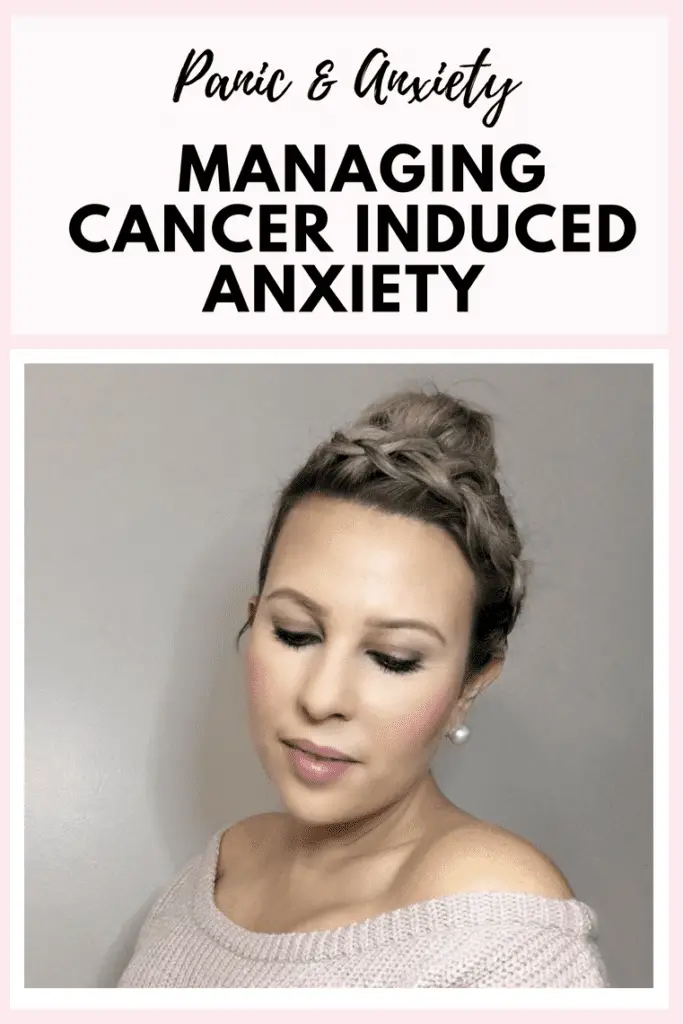
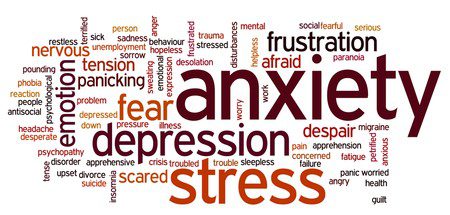
My History With Anxiety
Before cancer, I was lucky enough never to experience a full-fledged panic attack. I have always been a worrier and thought that worry and stress were synonymous with anxiety. After experiencing true cancer-induced anxiety though, I can say I didn’t have a clue. Full-fledged anxiety is so different from the day-to-day stress and worries that everyone experiences, but I had no idea until I went through it.
Anxiety Triggers
What triggers anxiety and panic attacks? The triggers can be unique for each person, but for many cancer patients, panic attacks can be sensory-related or situational meaning they present at hospitals or offices where bad news has been shared. It is a form of PTSD.
My First Panic Attack
My first panic attack happened in the hospital following my first mastectomy. I wasn’t ready to see my surgery site and the evidence of the trauma. We had asked that the nurses to give me time to look away before they unwrapped my bandages to check for swelling or infection. During this particular instance, my pain had worsened and I was experiencing extreme discomfort worsening by the minute. In a rush to check me, the nurse ripped off my bandages while I was looking down, despite my cries for her to wait. Her actions triggered an intense physical and emotional reaction. The panic and anxiety set in.
Symptoms of Anxiety
My heart began to race during my first panic attack, and nausea took over. Sweat poured from my body, my hands were shaking and my blood pressure spiked. All of these symptoms were magnified by the morphine for my pain. The physical symptoms worsened as my emotional concern grew. Never having experienced anything like this before, I feared the worst. I thought the medication was making me sick or the surgery had gone wrong (more on my surgery complications). The fear of experiencing these unfamiliar physical symptoms threatened my ability to think logically. It took some time and coaching from my husband along with deep breathing and a cool towel on my body overcome that anxiety.
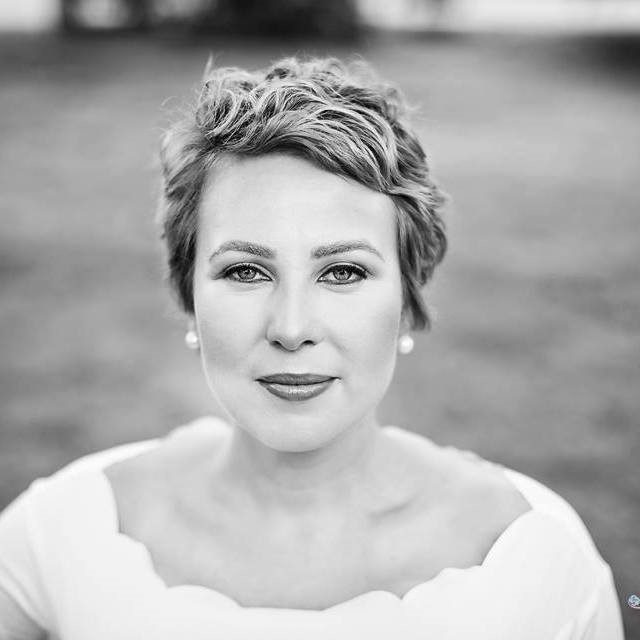
Recognizing the Signs of Anxiety
After this first horrific experience with anxiety, I began to learn how to recognize the onset of my anxiety and resulting physical symptoms much faster. The next time I had a similar attack was when I was preparing for my first post-mastectomy shower. Witnessing the full trauma my body endured triggered fear and panic to washed over me. My stomach threatened to revolt and my heart rate quickened. I sunk to the floor like a noodle unable to control my limbs or my breathing. Luckily my husband could see what was happening immediately was able to help me calm my body with a cool washcloth, deep breathing and a comforting voice. With his support I made it through my second panic attack. Recognizing the signs of anxiety is the first step towards managing it. You must first understand what it is before you can make a management “plan”.
Anxiety and Cancer Treatment
Throughout my various surgeries and chemotherapy I experienced a range of anxious moments. Some were more intense than others but most of them all shared a similar theme — loss of control. With time I was able to find ways to keep the extreme panic at bay. It took developing a toolkit of resources and practicing, to find out what works best for me in those uncomfortable moments. The anxiety has never fully gone away but I can say now that the moments are fewer and more spread out.
My Anxiety Toolkit
- Reflections & journaling
- Supportive discussions with loved ones about my anxiety & fears
- Essential oils for calming and stress
- Guided meditation (audio and/or visual)
- Deep belly breathing
- Yoga
- Repetitive mantras
- Therapy
In addition to the proactive and more natural coping tools that help me manage my anxiety, medication has been an effective resource . I know not everyone supports the use of anxiety medication and some may feel it is overused, but for me, it has been a lifesaver. Medication combined with therapy can be a powerful combination. Sometimes in extreme moments of anxiety or panic, I need the medication to first calm me enough to breathe, meditation or take additional action. Medication obviously won’t work for everyone but I encourage you to try all the tools and resources available to you in order to find a combination that is uniquely beneficial to you.
How to Live With Anxiety
As I prepared for my multiple surgery and the great unknown associated with life after cancer I have been forced to confront my fear and panic head on. It doesn’t change the familiar symptoms of anxiety resurfacing, but it does help me recover quicker.
Those anxious feelings wait until I am lying in bed trying to go to sleep, and then they pounce. All my distractions and excitement from the day fade away and I am left with nothing but my own thoughts. The familiar racing heart and chest pressure return and my frustration about experiencing this anxiety yet again leaves me discouraged.
I constantly remind myself I am not alone in these feelings. I have thousands of other women and men around me facing the same moments and in that I find comfort.
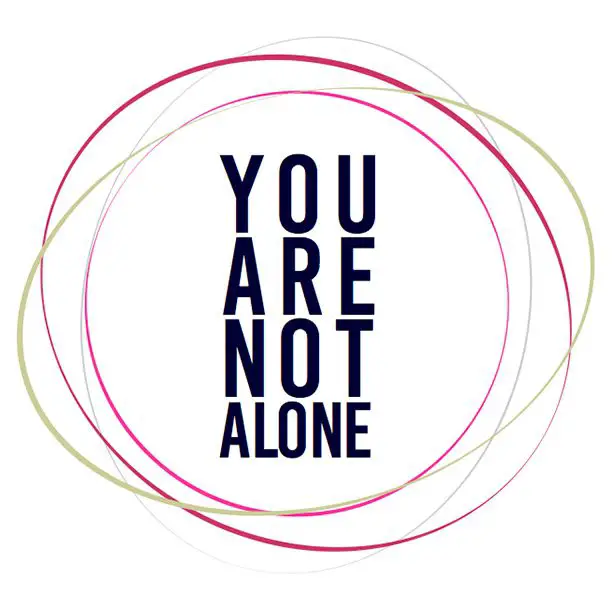
What Makes Cancer-Induced Anxiety Unique?
Luckily, I know exactly what is causing my anxiety. Many people struggle for years to determine the root of their anxiety. Cancer and everything related to my treatment and trauma give me a very logical explanation for my anxiety. Without this anxiety and fear, it wouldn’t all feel as accurate, so in a way, I am grateful for the physical manifestation of my feelings. As Mac keeps telling me, something would be wrong with me if I wasn’t feeling some sort of emotions.
I am extremely passionate about brining awareness to the experience of dealing with anxiety and mental health issues. Mental health as a whole seems to be a neglected area and cancer patients are even more at risk. You never know what someone else is facing internally and the power of just asking makes a huge difference. I have a friend that constantly asks me how I am taking care of my mental health and I have appreciated that beyond belief. She holds me accountable for that aspect of my care and ensures I am getting the support I need. Anxiety, panic and depression can be isolating and knowing you’re not alone is the first step to recovering and effective management of the problem.
Hopefully my experience with anxiety and some of my suggestions will help you through your anxiety journey. I would love to hear what strategies work for you and how you find relief from your anxiety challenges.
Check out my video on life after cancer for a little more insight on mental health.
Original written February 2, 2016. Updated on June 20, 2018.

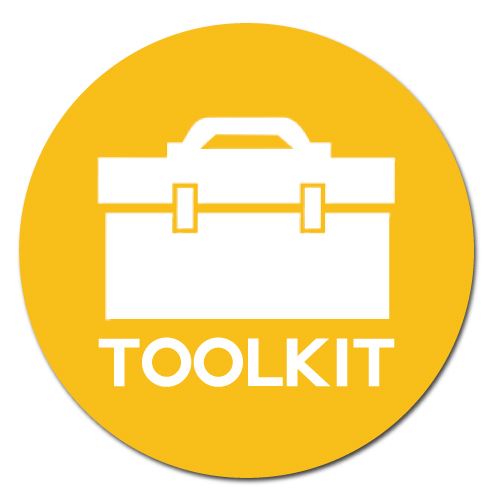
17 Comments